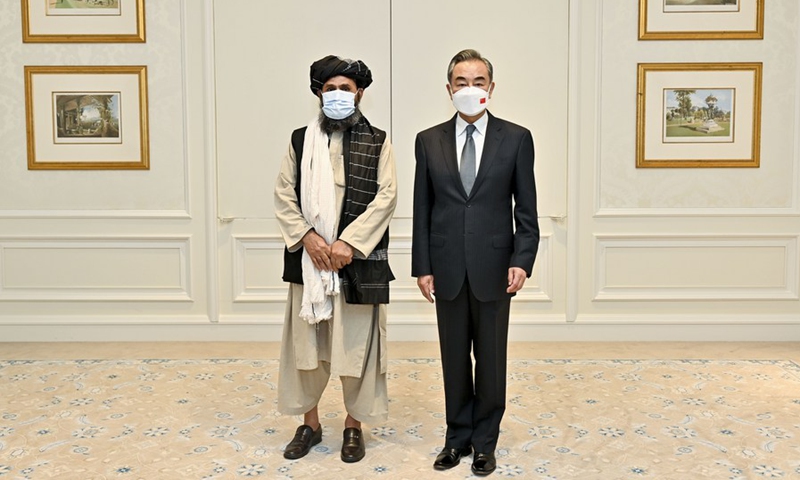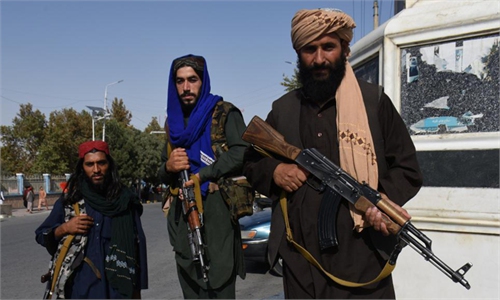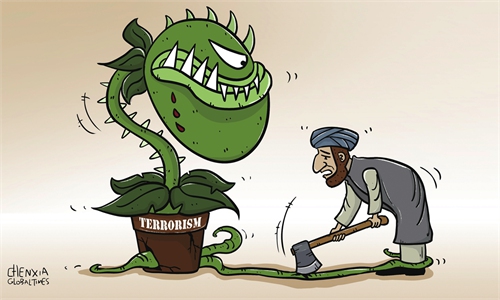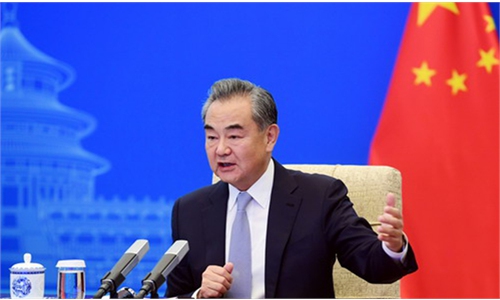Wang Yi meets Afghan Taliban in Doha, yielding more positive remarks on fighting terrorism: experts

Chinese State Councilor and Foreign Minister Wang Yi (R) meets with Mullah Abdul Ghani Baradar, acting deputy prime minister of the Afghan Taliban's interim government, in Doha, Qatar, on Oct. 25, 2021.(Photo: Xinhua)
Chinese State Councilor and Foreign Minister Wang Yi has wrapped up the first high-level engagement with a delegation of the interim Afghanistan government during his visit to the Qatari capital of Doha, with an emphasis on helping the Afghan people to overcome their difficulties and expressing hope for the interim Afghan Taliban government to fulfill promises on making a clean break with the "East Turkistan Islamic Movement (ETIM)" and other terrorist organizations.Compared with the Afghan Taliban's promises made during a visit to Tianjin in July, analysts noted that the remarks are more positive, showcasing its changes toward terrorism under the influence of China and other parties.
On Tuesday, Wang Yi met with Amir Khan Muttaqi, acting foreign minister of the Afghan interim government. Zabihullah Mujahid, spokesperson of the Islamic Emirate of Afghanistan, released a video on his Twitter account on Tuesday, which showed Muttaqi presenting a gift to Wang Yi and the two shaking hands.
Wang Yi said that China respects Afghanistan's exploration of a pattern that suits its own conditions, and China also respects the interim government's national implementation of policies.
Muttaqi said that the new government has realized actual governance of Afghanistan, and the country highly cherishes peace after 45 years of war. Good relations with China are important to Afghanistan, and the country is working to realize its own security and promote regional peace.
The two sides agreed to set up a liaison mechanism to discuss future exchanges, according to a release from the Chinese Foreign Ministry.
On Monday local time, Wang Yi met with Mullah Abdul Ghani Baradar, the acting deputy prime minister of the Afghan interim government, in Doha, which was their second meeting after their Tianjin meeting.
Baradar said on Monday that the Afghan Taliban attaches great importance to China's security concerns and will resolutely honor its promise and never allow any forces to use Afghan territory to harm China.
The wording of Baradar on fighting terrorism on Monday was more active than that at the Tianjin meeting, after the Afghan Taliban took power in Afghanistan. China's insistence of not interfering in the domestic affairs of Afghanistan and its timely assistance have also prompted the Afghan Taliban to fulfill its promise, Zhu Yongbiao, director of the Center for Afghanistan Studies in Lanzhou University, told the Global Times.
Zhu noted that although there are still gaps between China's expectations and the Afghan Taliban's promises on fighting terrorism, the latter is working on it, which showed that its attitude toward terrorism is changing under the positive guidance of China and other parties.
In an exclusive interview with the Global Times on September 9, the Afghan Taliban's spokesperson Suhail Shaheen said that many ETIM members had left Afghanistan. However, Shaheen did not reveal the exact number of ETIM members who had left or who were still in the country.
Some Chinese experts believed that some ETIM militants currently live in Takhar province near Baharak town.
In Tianjin, Wang Yi emphasized the ETIM's threat to China and expressed hope for the Taliban to cut ties with it and crack down on it. While in Doha, he pointed out that the ETIM is not only a threat to China but also to Afghanistan.
Zhu noted that the changes of wording in the Doha meeting are more meaningful and showcased the mutual respect between China and the Afghan Taliban, as well as their mutual reorganization of each other's importance.
Another important topic for the Doha meeting is to help the Taliban get assistance from the international community, given the humanitarian crisis in Afghanistan, with shortages of food and materials for the upcoming winter, Zhu noted.
Aside from emergency assistance from China, Pakistan and a few countries, most of the Western countries and the US are making lip-service promises. The US is also freezing the assets of the former Afghan government, experts said.
Wang Yi announced during a minister-level meeting of Afghanistan's neighboring countries on September 8 that the Chinese government decided to offer food, materials for winter, vaccines and medical products worth 200 million yuan ($31.4 million).
The first batch of humanitarian assistance from China arrived at the Kabul international airport on September 29. Chinese Ambassador to Afghanistan Wang Yu, together with Khalil Haqqani, the acting minister for refugees of the interim government, held the reception ceremony, during which Wang Yu said that China is speeding up preparing materials, including food, to help the Afghan people, the Xinhua News Agency reported.
During his meeting with Baradar, Wang Yi urged the US and the West to lift sanctions on the country. He also called on all parties to engage with the Afghan Taliban in a rational and pragmatic manner to help Afghanistan embark on a path of healthy development
Wang Yi's words were in line with the "Moscow format" talks held among China, Pakistan and Russia on Afghanistan on October 20, which is that the US - the initiator of the problems in Afghanistan - should take the main role to assist Afghanistan's rebuilding, Wang Shida, deputy director of the South Asia, Southeast Asia and Oceania Research Institute of Contemporary International Relations Research Academy of China, told the Global Times.
Recently, there has been a trend in the US and the West to let regional countries clean up the mess in Afghanistan.
Wang Yi's remarks in Doha were consistent with what he said in Tianjin and more comprehensive, which showed that China's policies toward the Afghanistan situation are more clear and complete, Wang Shida noted.
Wang Shida predicted that after communication with countries in the Middle East,regional countries, including China, Russia and Pakistan, may recognize the Afghan Taliban government in a collective way or in line with one another. Previously, Pakistan said that it would not recognize the Taliban government before fully communicating with related countries.
Regional countries have criteria and considerations different from the West on whether to recognize the Afghan Taliban.




